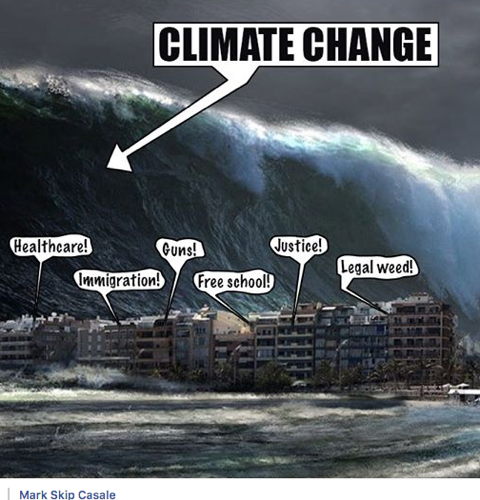Isn’t Climate Change More Urgent Than Reducing My Garbage?
I recently saw this picture of the Climate Change tidal wave looming over seemingly smaller issues. It seems futile to focus our time on anything other than climate change. But the truth is that these issues are almost all connected. Maybe reducing household waste can seem like a frivolous waste of time. But in fact, some of the most effective ways to reduce carbon emissions happen to be directly related to waste and our consumption patterns.
42% of US greenhouse gasses are from producing, processing, transporting and disposing of food and goods that we purchase. Another 8% of US emissions are from appliances and devices – so that means about half of our emissions are linked to the choices we make as consumers.
7 Ways to Reduce Carbon Emissions (and they happen to be zero garbage principles as well!)
- Stop eating (or eat less) meat – The packaging around meat and other animal products is rarely recyclable, so eating a plant-based diet is a common choice for reducing waste.
- Buy local – This is one of the fastest ways to reduce your packaging (also known as garbage). Not only are local products typically less packaged (or not packaged at all if you buy something used!) you can also connect with a local human to reduce your packaging even further. For example, ask a local restaurant to make tortillas for you and put them in your own container, or buy your teas from a local herbalist.
- Reduce food waste – Of course composting is a cornerstone of a zero garbage lifestyle, and so is making an effort to buy only the food we’re going to eat. The average american throws away 4.5 pounds of garbage per day. About half of that is food waste or scraps. Reduce the food waste and compost what is left over.
- Avoid useless purchases – Garbage in, garbage out. The less we buy, the less we have to break and throw away.
- Energy efficient appliances – These also tend to be higher quality, longer-lasting, and less likely to end up in the dump!
- Reduce use of air conditioning and refrigeration – When we’re avoiding useless purchases, we don’t need as much space to store it all…. and with a smaller home, we need less air conditioning. When we buy local food and only buy what we need, we consume it faster and need smaller refrigerators.
- Alternative transportation – We already know that buying in bulk reduces packaging waste. Well, moving around town “in bulk” can reduce our waste too. Individual vehicles require their own upkeep, from oil changes to wiper blades to larger parts. On a bus or other public transportation, hundreds or even thousands of people can ride for the environmental cost of wiper blades or an oil change. On bikes, the parts are smaller and even more recyclable/reusable. On foot, there’s no garbage at all!
More encouragement to reduce / reuse / recycle
The City’s Solid Waste Reduction, Diversion, and Recycling Master Plan identified several additional programs needed order to meet the City’s goal of diverting more materials from the landfill, notably expanded recycling, a food waste compost program, and construction and demolition waste recycling.
This will affect your rates, and improve the city’s diversion rate.
Read more here:
http://www.fayetteville-ar.gov/3558/New-Rates

